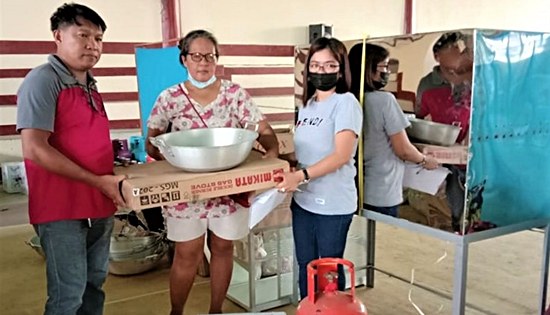P3.2M worth of
Kabuhayan packages released in Northern Samar

By
JEROLD C. AMAGO, DOLE
NSFO
July 30, 2021
CATARMAN, Northern
Samar – The Department of Labor and Employment Northern Samar
Field Office (DOLE-NSFO) here recently released over P3.2 million
pesos worth of livelihood projects benefitting some 96 unemployed
and disadvantaged workers from the municipalities of Bobon and
Catarman.
Formal turn-over
ceremonies followed with the actual distribution of project
equipment and raw materials were each held on 22 and 23 July 2021 in
Brgy. Cervantes, Catarman, and in Bobon, Northern Samar,
respectively. DOLE-NSFO Chief and Provincial Head Patria A. Bigcas,
Bobon Municipal Administrator Rene Celespara, and Cervantes Punong
Barangay graced the events.
The projects consisted of
various Kabuhayan packages amounting to a maximum of P30,000 pesos
worth of tools, jigs, raw materials, and other equipment for the
approved Kabuhayan Starter kits. They include Sari-Sari Store
Kabuhayan Package, Food-processing Business, Rice-Retailing, Bakery
Production Project, Barbecue Making, Fish Vending, Tailoring,
Welding, Piggery and Poultry Raising, among others.
The 96 beneficiaries which
were composed mostly of parents of child laborers, were identified
and prioritized based on the Child Labor Profiling Program held in
2019 by the DOLE-NSFO in the two municipalities. Ms. Bigcas said the
Kabuhayan projects were primarily aimed at helping the beneficiaries
create sources of livelihood and thereby enable them to adequately
earn incomes needed for their families.
“The immediate and long
term objectives of this is to significantly reduce, if not
eliminate, the incidence of child labor in the areas,” she added.
In his message, Bobon
Municipal Administrator Mr. Rene Celespara thanked DOLE for its
“continued support to their poverty-alleviation initiatives.”
He also emphasized that,
while the packages are provided as a grant, he reminded the
beneficiaries that the project is part of the efforts between the
DOLE and LGU to eliminate child labor, and that by providing parents
a sustainable means of livelihood, their children can focus on their
welfare, health and education, instead of engaging in hazardous
work.
Susan Polinas, 64, farmer
and mother of thirteen children from Barangay Cervantes, Catarman,
Northern Samar, said that she didn't have a choice but to allow one
of her children to work as a paid laborer in a nearby construction.
“Life is difficult especially now that we barely have coconuts due
to constant typhoons,” sighed Polinas.
With the DOLE kabuhayan,
however, she hopes that it will help her earn more and provide for
the needs of her household.
The DOLE likewise provided
the beneficiaries with a crash course on records-keeping to help
them sustain their business through proper financial management.
In surveys conducted
between 2018 to 2019, more than 80 child laborers were profiled,
mostly out-of-school male aged 14 to 17, working in construction,
farming and other hazardous occupations. Reasons often cited as to
why they sacrifice school and health to earn a living is to support
their families by giving money to their parents and buying things
for their households.
With the restrictions due
to COVID-19 starting to ease, CLP surveys have resumed and are
currently on-going.